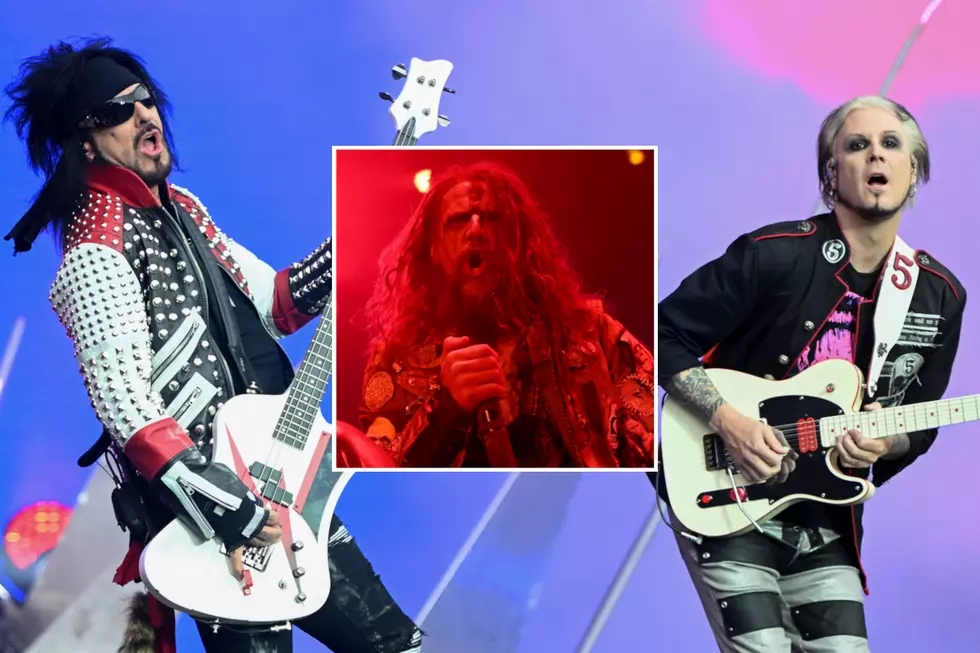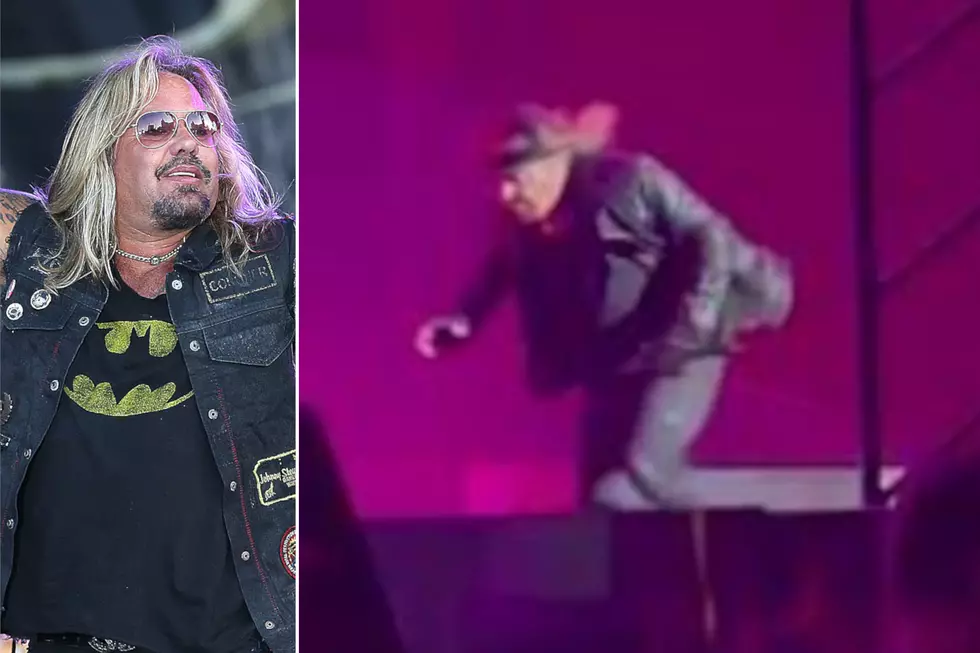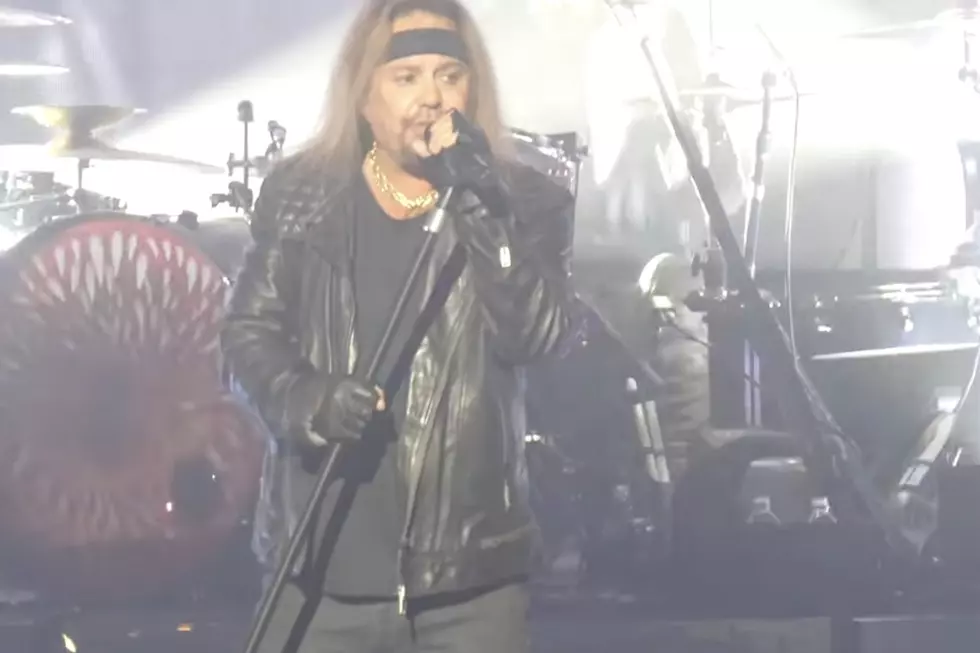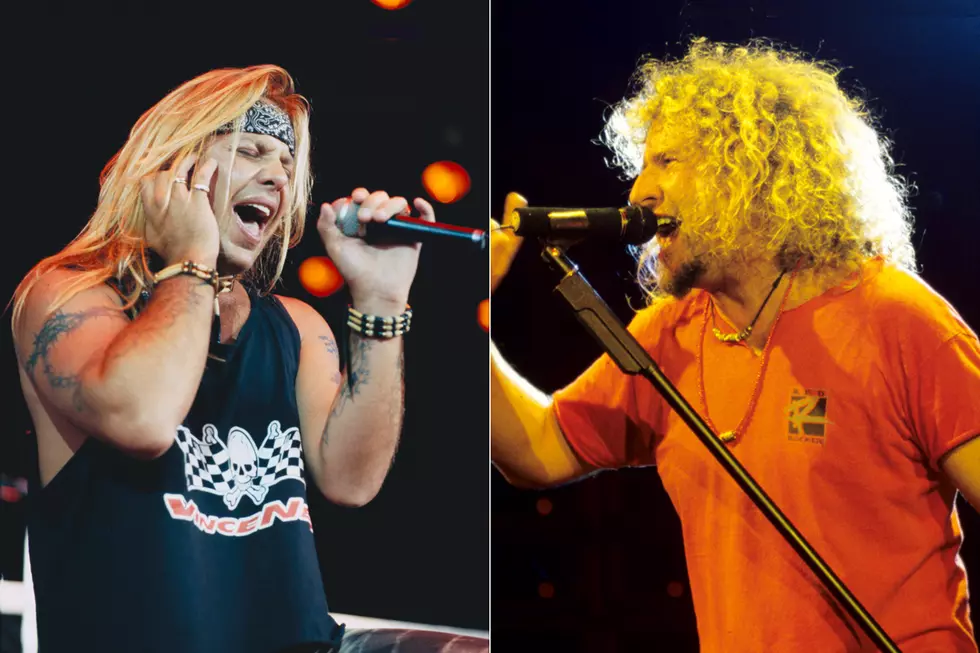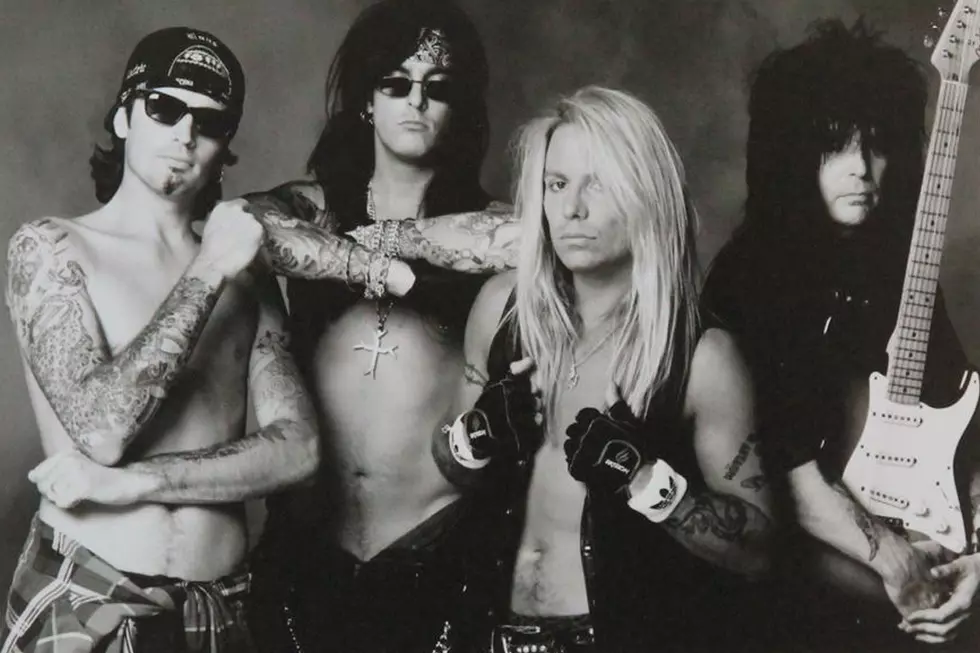
Why Motley Crue Fired Vince Neil
Motley Crue looked like they were primed to rule rock 'n' roll for years to come following the huge sales of 1989's Dr. Feelgood album. In reality, however, they were really getting ready to implode.
It all fell apart in February 1992, just as the band was starting to work out songs for their Feelgood follow-up. In theory, they should have been refreshed after taking some time off to recharge from the grueling Dr. Feelgood tour, but it didn't work out that way; from the beginning, it was apparent that singer Vince Neil wasn't on the same page as the rest of the group, and on Feb. 10, they called a meeting that ended in his ouster. On Feb. 14, they released a statement saying he'd left because his longtime hobby, car racing, had "become a priority" in his life.
Unsurprisingly, Neil had a different point of view regarding what went down. "It came as a complete shock to me," he insisted during a 1992 appearance on Dennis Miller's talk show. "Two days after my birthday – like, 'Happy birthday, Vince.' ... Everybody had 25 percent input, so 75 percent voted me out. They're great guys; they just had to do what they felt they had to do."
Neil went into detail the following year for the Los Angeles Times, saying the split was prompted by the band's desire to go in a bluesier direction. "We had been rehearsing for a few months but we didn't do any recording," he explained. "It just wasn't sounding good to me. I'm not a blues singer and Motley is a rock band – not a blues band. I think it's a stupid idea that will alienate the fans. I would have tried the blues thing and tried to put my own spin on it, but I never got the chance."
All that said, Neil insisted he would have stayed with the Crue if given the opportunity. "This is like starting a new career – dealing with all those insecurities," he admitted. "But I think I can deal with them."
That new career entailed signing a new solo deal with Warner Bros. – he didn't want to share the Elektra label with his former bandmates, and admitted they didn't offer him as much money as he wanted anyway – and putting together a new band. He also claimed to be fielding a lot of offers to work with friends from other groups, and as proof, he released his debut solo single, "You're Invited (But Your Friend Can't Come)," in the summer of 1992: a track from the Encino Man soundtrack, it was co-written with Damn Yankees members Jack Blades and Tommy Shaw.
Listen to Vince Neil Perform 'You're Invited (But Your Friend Can't Come)'
Neil quickly assembled a group that included guitarist Steve Stevens and set about working on his solo debut, Exposed, which notched a respectable No. 13 peak after its release in the spring of 1993. Having struck first in the volley of post-breakup records – and scored an opening slot on that year's Van Halen tour in the bargain – he seemed confident in closing the Motley Crue chapter of his life for good.
"I haven't talked to those guys since it happened," Neil shrugged after Exposed was released. "I don't really care if I talk to them again."
Neil's former bandmates, meanwhile, took a little time settling on his replacement, conducting a series of auditions that may or may not have included then-Skid Row singer Sebastian Bach before deciding to extend an offer to John Corabi, frontman for the band Scream. The new-look Crue entered the studio for their first album without Neil – and what would be their first collection of new music in five years, 1994's Motley Crue.
As the glam-friendly '80s gave way to the grungy '90s, most of the artists in Neil and Motley Crue's peer group had problems hanging onto their audience, and they themselves were no exception; while Motley Crue went gold and Exposed performed reasonably well, neither were up to the lofty standards set by the string of platinum records leading up to the split – and Neil's second solo album, 1995's Carved in Stone, petered out at a lowly No. 139, while Crue fans continued to clamor for his return to the lineup and Corabi grew weary of the constant comparisons.
As David Lee Roth and former Chicago singer Peter Cetera could have told Neil, flying the coop after a band's biggest record isn't necessarily the springboard to lasting solo stardom that it might look like. And in this case, what may have worked against Neil was exactly what helped make Motley Crue so much fun: It was a band of four distinct personalities, and though Neil's voice was a big part of what put them on the map, it was far from the only thing. Even his biggest fans may have missed Tommy Lee's drums, Mick Mars' guitars and Nikki Sixx's songwriting.
Still, a reunion wasn't the first thing on anyone's mind. "I’m not running around spitting on pictures of Vince Neil. I’m done being pissed off. He’s got to go on; we’ve got to go on. The fans too," Sixx told Kerrang! in 1996. "I know if you’re into a band it means something to you, and until we have a quote-unquote ‘successful’ album like we had in the past, it will always be looked on that that lineup was better."
Listen to Motley Crue Perform 'Hooligan's Holiday'
Sixx also vowed that the cloud of controversy surrounding the self-titled effort had motivated Corabi – and in turn, the rest of the band – to step up their game for the next LP. "We’re obsessed with making this the most invigorating album Motley have ever done. If it’s gonna be about sex, drugs and rock ‘n’ roll, then let’s make it the ultimate in decadence! Or if it’s gonna be a love song, let’s break their fucking hearts," he laughed. "This album is really extreme!"
As Crue fans know, no one ever got to hear what Sixx had in mind for that album. Recognizing that their clients would make more money together than apart, band manager Allen Kovac worked with Neil's manager Bert Stein to bring the two sides back together. What would have seemed nearly impossible five years previous paid off in 1997, when Neil stepped back in front of the mic for Motley Crue's seventh studio LP, Generation Swine.
A lot of time had passed, however, and the giant head of steam the band had built up after Dr. Feelgood had mostly dissipated by the time Swine was released. Not only that, but the Motley Crue of 1989 was distinctly different from the Crue of 1997.
"We're still family. We still, basically, love each other. It was a business decision for me," Neil argued in a Time interview from 2010. "When I was – depending on how you look at it – fired or I quit the band, I was a part of Motley Crue Inc. And I chose not to come back into that. I looked at myself as a free agent on a football team. I didn't have to be worried about any corporate decisions. All I had to do was show up and sing."
Motley Crue kept things on a fairly even keel after reuniting with Neil – for the most part, anyway. And if their subsequent recent albums didn't have the impact their multi-platinum predecessors enjoyed, they were still a big enough draw on the live circuit that their farewell tour packed seats after its announcement in early 2014.
Would have said that final goodbye to Motley Crue if they hadn't split with Vince Neil in February of 1992, setting in motion years of turmoil? We'll never know – but like the band themselves have pointed out in their own inimitable way, nothing lasts forever.
Top 30 Glam Metal Albums
You Think You Know Motley Crue?
More From Ultimate Classic Rock




